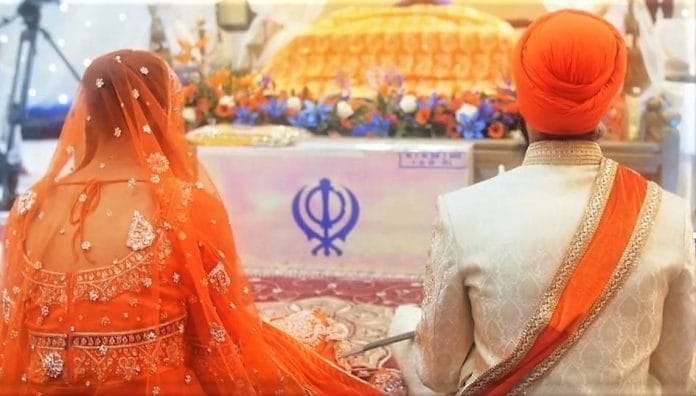Delhi has joined the growing list of states that will now allow Sikhs to register their marriages under their own Act. But does it have any tangible benefits?
New Delhi: It is odd for a religious community to have its marriages registered under another community’s laws. But for decades, Sikhs in India have had to do just that – a fact which community leaders perceive as a fundamental injustice.
Earlier this month, the Delhi government became one of the many states to “correct this discrepancy” by allowing Sikhs to register their marriages under the Anand Marriage Act, instead of the umbrella Hindu Marriage Act.
Hailing the Delhi government’s decision, Rajouri Garden MLA Manjinder Singh Sirsa, who represents the Shiromani Akali Dal-BJP alliance, says it is “a technical and moral victory” for the Sikh community in India.
“By 2018, I believe it will be notified across the country,” he says confidently.
He may have a point – ever since the BJP came to power at the Centre in 2014, a total of 13 other states have notified the Anand Marriage Act – most of them BJP-ruled states.
History of the Anand Marriage Act
It was over a century ago in 1909 that the Anand Marriage Act was passed, thereby validating “the marriage ceremony common among the Sikhs called Anand Karaj”.
However, post-independence, Sikh marriages were brought under the fold of the Hindu Marriage Act, as a result of which, even though Sikhs identified as a separate religion, they were required to register their marriages as Hindus.
“It was utterly painful for people,” says former Rajya Sabha MP and National Commission for Minorities chairperson Tarlochan Singh, who moved a Private Member’s Bill in Parliament in 2004 and raised another question in 2009, “to rectify” this.
“The Anand Marriage Act of 1909 was still valid, so I asked that registration of marriage be made possible under that,” he says.
It was, however, only in 2012 that the amendment was finally passed, empowering the state governments to frame rules for registration of marriages under the Anand Marriage Act.
Yet, with states like Haryana and Punjab taking the lead, the BJP government at the Centre issued a notice to all state governments in 2017, urging them to notify the rules under the Act.
Tangible benefits or a game of identity?
It is definitely about the assertion of Sikh identity, most leaders from the community agree. “No religion would be happy if the most important document of their lives (the marriage certificate) identified its members with another religion,” says Sirsa. Such an arrangement, he adds, is bound to alienate the Sikhs.
Legal scholar and former National Commission for Minorities chairperson Tahir Mahmood agrees. “It would have been far better to call the Act the Indian Marriage Act if it had to include Sikhs, Jains and Buddhists,” he says.
Community leaders, in fact, ask the hypothetical question that if the Act was called the Sikh Marriage Act, would Hindus accept it?
There are some technical issues too. “There are so many young Sikhs who go abroad and face problems because their certificates are considered fake,” says Sirsa. “Their passport and other documents would identify them as Sikh and their marriage certificates as Hindus.”
This problem, he and others believe, would be now addressed.
But registration of marriage is only part of the problem. The Anand Marriage Act is silent on provisions of divorce and adoption, leaving scope for ambiguity. “This is something our own community hasn’t been able to make up its mind over since the Akal Takht does not recognise divorce,” a community leader says on the condition of anonymity.
What about the Uniform Civil Code?
But how does the BJP reconcile its push for the Anand Marriage Act on one hand with its rhetoric about the Uniform Civil Code on the other?
“The UCC will get implemented when it does, but that does not stop us from addressing the issues of the minorities right now,” says Tajinder Pal Singh Bagga, spokesperson for the Delhi BJP. “As a minority, Sikhs should get what they want.”
Sirsa, who is also general secretary of the Delhi Sikh Gurdwara Management Committee, and has personally been pursuing the matter with state governments, also thinks that the demand for Sikh marriage registration and the push for UCC are not contradictory.
“We are not opposed to the Uniform Civil Code. If the government brings a code, we will give our demands like all other communities. But till then, the Sikhs cannot be deprived of their rights,” he says.
On the issue of UCC, the BJP’s 2014 Lok Sabha election manifesto had said: “The BJP reiterates its stand to draft a Uniform Civil Code, drawing upon the best traditions and harmonising them with modern times.”
But some think the UCC is only a political mirage. “See, the Uniform Civil Code is a utopia. All other communities have their own laws, so why not Sikhs?” asks Tarlochan Singh.
Mahmood is even more critical. “I don’t think anyone is seriously discussing the UCC. It is only a political slogan. Even the Law Commission has stopped deliberations over it,” he says.







Solemnising nuptial knot is a religious ceremony. One can observe it According to their tradition and culture. Registering the marriage should be compulsory for all. Common civil code should apply every one no matter in which community one belongs to. Only political will to apply it into practice is very crucial point. Mr. Modi’s government certenly can make it happen. May be in his 2nd term if he wins 2019 election.